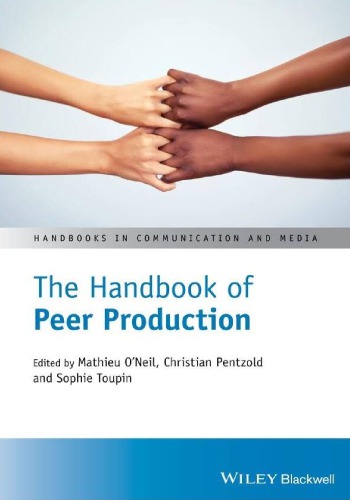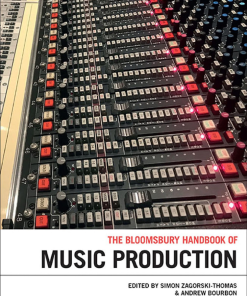The Handbook of Peer Production 1st Edition by Wiley Blackwell 9781119537090 1119537096
$50.00 Original price was: $50.00.$25.00Current price is: $25.00.
The Handbook of Peer Production 1st Edition by Wiley Blackwell – Ebook PDF Instant Download/Delivery: 9781119537090, 1119537096
Full download The Handbook of Peer Production 1st Edition after payment

Product details:
• ISBN 10:1119537096
• ISBN 13:9781119537090
• Author:Wiley Blackwell
The Handbook of Peer Production
The definitive reference work with comprehensive analysis and review of peer production
Peer production is no longer the sole domain of small groups of technical or academic elites. The internet has enabled millions of people to collectively produce, revise, and distribute everything from computer operating systems and applications to encyclopedia articles and film and television databases. Today, peer production has branched out to include wireless networks, online currencies, biohacking, and peer-to-peer urbanism, amongst others. The Handbook of Peer Production outlines central concepts, examines current and emerging areas of application, and analyzes the forms and principles of cooperation that continue to impact multiple areas of production and sociality.
Featuring contributions from an international team of experts in the field, this landmark work maps the origins and manifestations of peer production, discusses the factors and conditions that are enabling, advancing, and co-opting peer production, and considers its current impact and potential consequences for the social order. Detailed chapters address the governance, political economy, and cultures of peer production, user motivations, social rules and norms, the role of peer production in social change and activism, and much more. Filling a gap in available literature as the only extensive overview of peer production’s modes of generating informational goods and services, this groundbreaking volume:
Offers accessible, up-to-date information to both specialists and non-specialists across academia, industry, journalism, and public advocacy
Includes interviews with leading practitioners discussing the future of peer production Discusses the history, traditions, key debates, and pioneers of peer production
Explores technologies for peer production, openness and licensing, peer learning, open design and manufacturing, and free and open-source software
The Handbook of Peer Production is an indispensable resource for students, instructors, researchers, and professionals working in fields including communication studies, science and technology studies, sociology, and management studies, as well as those interested in the network information economy, the public domain, and new forms of organization and networking.
The Handbook of Peer Production 1st Table of contents:
Chapter Summaries
Part I Introduction
Part II Concepts: Explaining Peer Production
Part III Conditions: Enabling Peer Production
Part IV Cases: Realizing Peer Production
Part V Conflicts: Peer Production and the World
Part VI Conversions: Advancing Peer Production
Part I: Introduction
1 The Duality of Peer Production
1 Introduction
2 Peer‐to‐Peer Infrastructure
3 The Exclusive Attraction of Commons‐Based Peer Production
4 The Digital Commons and Capitalist Production
5 The Handbook of Peer Production Aims to be Inclusive and Political
References
Part II: Concepts: Explaining Peer Production
2 Grammar of Peer Production
1 Introduction
2 Peer‐to‐Peer
3 Principles and Characteristics of Peer Production
4 Entities of a New Commons‐Based Ecosystem
5 The Transcendent Aspects of Peer Production
6 Instead of Conclusions: Towards a P2P Theory
Acknowledgments
References
3 Political Economy of Peer Production
1 Introduction
2 Transformation of Capitalism in the 20th Century
3 Response to the Crisis of the 1970s
4 The Transformation of the Internet and Web‐Based Business Models
5 The Commons as Alternatives
6 Concluding Remarks
References
4 Social Norms and Rules in Peer Production
1 Introduction
2 Why Rules and Norms? Institutional Conditions for Peer Production
3 What Rules and Norms? Policies, Guidelines, and Basic Understandings in Peer Production
4 How to Create Rules and Norms? Institutional Work in Peer Production
5 Whither Rules and Norms? Governance, Hierarchies, and Bureaucracy in Peer Production
6 Conclusion
References
5 Cultures of Peer Production
1 Introduction: Peer Production as Cultural Production
2 Overview and Limitations
3 Autonomy
4 Meritocracy
5 Openness
6 Inspiration
7 Conclusion
Acknowledgments
References
6 Commons‐Based Peer Production and Virtue (reprint)
I Commons‐Based Peer Production – Examples
II Commons‐Based Peer Production – Principles
III Commons‐Based Peer Production and Virtue
IV From Structure to Virtue
V Public Policy
VI Conclusion
Part III: Conditions: Enabling Peer Production
7 Prophets and Advocates of Peer Production
1 Introduction: A New Specter is Haunting the World
2 Before 2000: A Period of Gestation
3 2000s: Emergence of Peer Production Theory
4 Post‐2010: Peer Production Theory Moves into the Mainstream
5 Conclusion: What is the Impact of Peer Production Theory Today?
6 Acknowledgments
References
8 Virtue, Efficiency, and the Sharing Economy
1 Introduction
2 Commons‐Based Peer Production and Adjacent Practices
3 Participation, Collaboration and the Rhetorical Dimensions of Network Culture
4 Utopian Thinking and Copyright Conflicts
5 Conclusion
References
9 Open Licensing Peer Production
1 Introduction
2 Free, Libre, and Open Source Software Licenses
3 Open Licenses for Cultural Works
4 Open Licenses for Functional Works
5 Developments in Open Licensing
6 Conclusion
References
10 User Motivations in Peer Production
1 Introduction
2 Individual Motivation
3 Choosing a Task to Work On
4 Peer Production as a Social Practice
5 Conclusion
References
11 Governing for Growth in Scope
1 Introduction
2 Case Analysis
3 Scope of the Innovation LifeCycle
4 Governance Rights
5 Patterns of Growth
6 Advancing a Research Agenda
References
Part IV: Cases: Realizing Peer Production
12 Free and Open Source Software
1 Introduction
2 Genesis of a Movement
3 How it Works: The Economy and Sociology of Free and Open Source Software
4 Beyond Experimentation: Mainstream Adoption and Social Significance
5 Challenges
6 Conclusion
References
13 Wikipedia and Wikis
1 Introduction
2 The Wiki Platform
3 Wikipedia: Background and History
4 Wikipedia and its Contributors
5 Wikipedia and Its Content
6 The Wikipedia Community
7 Wikipedia and the Role of Experts
8 Wikipedia and the Media Ecology
9 Conclusion
References
14 Participatory Cartography
1 Introduction: New Materialism and the Technologies of Hacker Cartography
2 Technological Power
3 OpenStreetMap
4 Global Positioning System
5 DIY Drones and 3D Robotics
6 Countermapping in Indonesia
7 Conclusion
References
15 P2P Learning
1 Introduction
2 Curriculum Selection
3 Learning Process
4 Knowledge Abstraction
5 Learning Infrastructures
6 Conclusion
Acknowledgments
References
16 Biohacking
1 Introduction
2 History
3 Practices and Identities
4 Examples of DIY Medicine
5 Openness and Democratization
6 A Sociology of the “yourself”
7 Ethics and Governance
8 Economics and Valuation
9 Conclusion
References
17 Makers
1 Introduction
2 A Short and Incomplete History of Making
3 Defining Making: Words Matter
4 Empowerment and Emancipation: Users Becoming Makers
5 Maker Communities and the “Movement”
6 Discussion and Conclusion
References
18 Blockchain, or, Peer Production Without Guarantees
1 Introduction
2 Coase’s Benkler
3 Coordination Issues
4 Peer Production After Bitcoin
5 Peer Production
6 Peer Development
7 Peer Governance
8 Peer Exchange
9 Conclusion
References
19 Community Wireless Networks
1 Introduction
2 Design and Social History of Community Broadband Projects
3 Motivations for Deploying Community WiFi Networks
4 Technological Innovation
5 Conclusion
References
20 Commoning the Urban
1 Introduction
2 Urban Commons: A Sociospatial Identity
3 Urban Commons: A Political and Cultural Identity
4 Bottom‐Up vs. Top‐Down, Artists and Architects Initiatives
5 Commoning the Urban: Trends, Gaps, and Opportunities
6 Possible Futures
References
Part V: Conflicts: Peer Production and the World
21 Peer Production and Social Change
1 Introduction
2 Self‐Governance Outside the Political System: Prefigurative Politics
3 Self‐Governance and Engagement in Electoral Politics
4 The Economics of the Commons and Labor
5 Conclusion: Towards a Sustainable Contribution Society?
References
22 Peer Production and Collective Action
1 Introduction
2 Peer Production in Context: A Brief History
3 Enabling Infrastructure and its Social Affordances
4 The Consequences of Peer Production for Collective Action
5 Three Unresolved Tensions
6 Conclusions
References
23 Feminist Peer Production
1 Introduction
2 Feminist Peer Production as Situated Knowledge
3 Three Case Studies
References
24 Postcolonial Peer Production
1 Introduction
2 A Brief History of PCPP: An Indian Perspective
3 Traditions of Popular Knowledge
4 Money and Creativity in PCPP
5 The Organizational Structure of PCPP
6 Conclusion
References
25 Gaps in Peer Design
1 Introduction
2 Faroo, or the Socio‐Economic Implications of a Peer Design Choice
3 Wuala, or Ultimately Renouncing Peer Design
4 Conclusions
References
26 Makerspaces and Peer Production
1 Introduction
2 Spaces of Possibility
3 Spaces of Tension
4 Spaces for Post‐Automation?
5 Spaces of Liberation?
6 Conclusion
References
27 Peer Production and State Theory
1 Introduction
2 With or Without the State: Peer Production from the Economic Sphere to the Political, and Back Again
3 On the (Partner) State as Agency for Social Transformation
4 On Cooperatives as Vehicles of Economic and Political Agency
5 From Counter‐Power to Social Reform: The Partner State in Motion
6 Conclusion
References
Part VI: Conversions: Advancing Peer Production
28 Making a Case for Peer Production
Interview with Peter Bloom, Founder of Rhizomatica, Oaxaca, Mexico, 21 February 2019
Interview with Mariam Mecky, Communications Unit Head at HarassMap, Cairo, Egypt, March 13, 2019
Interview with Ory Okolloh, Co‐founder of Ushahidi, Director of Investments at Omidyar Network, Johannesburg, South Africa, 17 June 2019
Interview with Abraham Taherivand, Executive Director of Wikimedia Deutschland, Berlin, Germany, 18 March 2019
Interview with Stefano Zacchiroli, former Debian Project Leader, 17 June 2019
References
29 What’s Next?
1 Introduction
2 Peer Production and Productivity
3 Peer Production and Social Justice
4 Do We Need Peer Production Studies?
References
30 Be Your Own Peer!
Foreword
1 Introduction
2 Kicking It to the Next Level: Strategic Principles
3 Calling All Peers: Practical Proposals
4 Conclusion
References
Index
End User License Agreement
Read Less
People also search for The Handbook of Peer Production 1st:
the handbook of peer production
the handbook of program management
the handbook of program management pdf
the handbook of community practice
the handbook of community practice pdf
You may also like…
Uncategorized
Politics & Philosophy - Anthropology
Biology and other natural sciences - Plants: Agriculture and Forestry
Business & Economics - Real Estate
Politics & Philosophy - Social Sciences
Business & Economics - Industries
Handbook of Biofuels Production Processes and Technologies 2nd Edition Rafael Luque
Medicine - Ophthalmology












